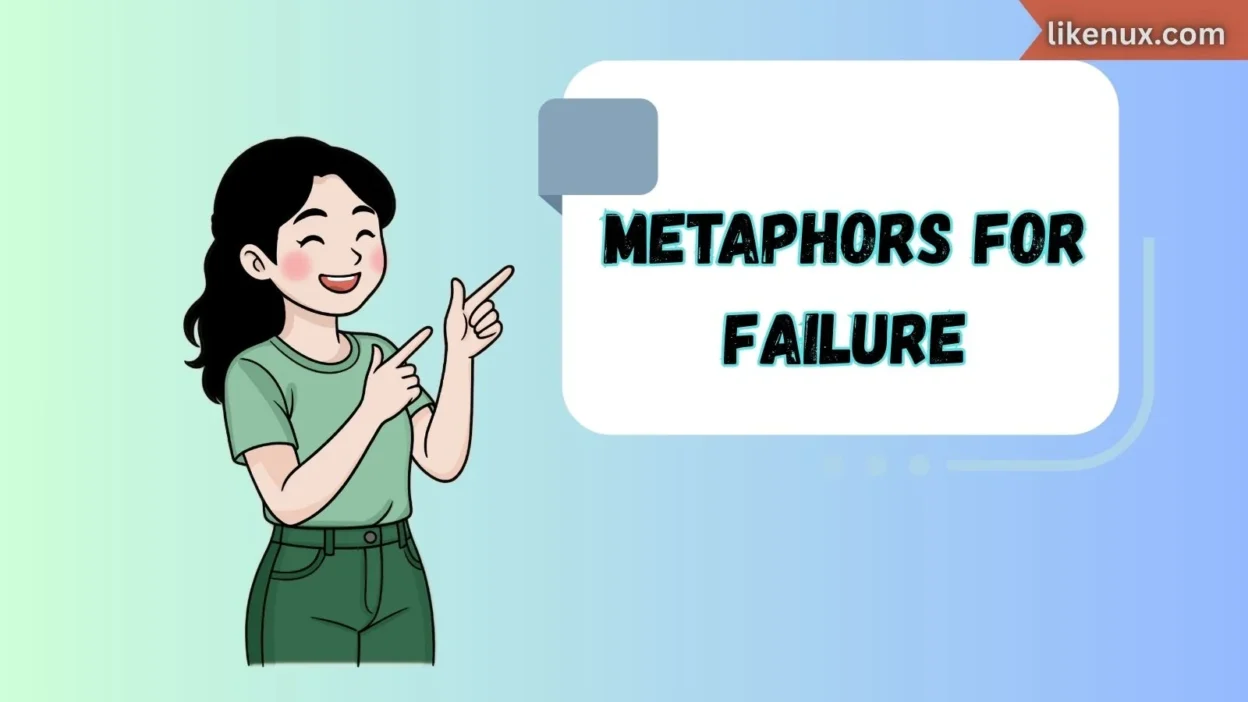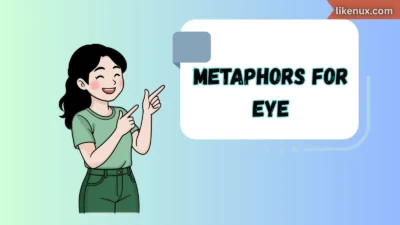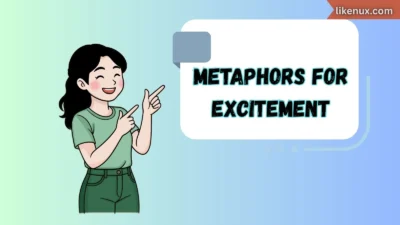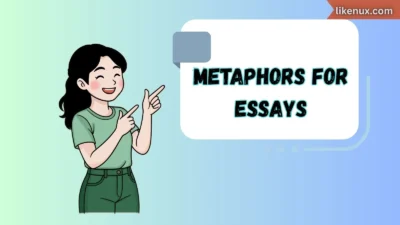Failure — it’s a word that can sting, yet it’s also something every single one of us experiences. Whether it’s missing a goal, losing an opportunity, or taking a path that didn’t quite lead where we hoped, failure shapes who we become. But how do we talk about it? How do we express failure with grace, empathy, and understanding — instead of harshness or judgment? That’s where metaphors for failure come in.
They help us speak from the heart, turning tough experiences into stories of learning and resilience. In this article, I’ll share 25 thoughtful metaphors that not only capture the essence of failure but also help us communicate it with warmth, care, and self-compassion.
1. Failure is a Detour, Not a Dead End
Meaning: A temporary redirection, not the end of the road.
In a Sentence: When my first business collapsed, I realized failure was just a detour, not a dead end.
Best Use: When offering encouragement or perspective during setbacks.
Other Ways to Say: “A stepping stone,” “A reroute,” “A new direction.”
2. Failure is a Bruise, Not a Tattoo
Meaning: It hurts now, but it doesn’t define you forever.
In a Sentence: That rejection still hurts, but I remind myself—it’s a bruise, not a tattoo.
Best Use: When emphasizing healing, resilience, or emotional recovery.
Other Ways to Say: “A temporary scar,” “A lesson, not a label.”
3. Failure is the Soil Where Success Grows
Meaning: Mistakes nurture growth and wisdom.
In a Sentence: Each failed attempt became the soil where my future success took root.
Best Use: Motivational writing or reflective discussions.
Other Ways to Say: “Foundation for success,” “Seeds of wisdom.”
4. Failure is a Storm Before the Rainbow
Meaning: Struggle often precedes beautiful results.
In a Sentence: Every setback I faced was just the storm before my rainbow.
Best Use: To inspire perseverance or optimism.
Other Ways to Say: “Dark before dawn,” “Silver lining moment.”
5. Failure is a Broken Compass
Meaning: It shows what doesn’t work, guiding us closer to what does.
In a Sentence: That failed project was my broken compass—it helped me find my true direction.
Best Use: Coaching, leadership talks, or journaling.
Other Ways to Say: “Learning tool,” “Guide by error.”
6. Failure is a Teacher in Disguise
Meaning: It offers life lessons we wouldn’t learn otherwise.
In a Sentence: Failure has always been my most patient teacher.
Best Use: Reflection or self-improvement contexts.
Other Ways to Say: “Life’s lesson,” “Hidden mentor.”
7. Failure is a Closed Door Leading to Another
Meaning: One opportunity ends, another begins.
In a Sentence: When one door closed, I learned to knock on the next.
Best Use: Career changes or motivational speeches.
Other Ways to Say: “New beginning,” “Fresh opportunity.”
8. Failure is a Blurry Mirror
Meaning: It makes us re-examine who we are and what we value.
In a Sentence: Failure reflected my flaws and strengths like a blurry mirror.
Best Use: Deep reflection or personal growth writing.
Other Ways to Say: “Moment of self-realization,” “Reality check.”
9. Failure is a Roadblock on a Marathon
Meaning: It slows you down, but doesn’t stop your race.
In a Sentence: Every roadblock I faced just made the finish line more meaningful.
Best Use: When discussing perseverance or long-term goals.
Other Ways to Say: “Temporary setback,” “A hurdle.”
10. Failure is an Unfinished Painting
Meaning: The story isn’t over yet.
In a Sentence: This failure is just an unfinished painting—I’m still working on it.
Best Use: Artistic, motivational, or reflective tone.
Other Ways to Say: “Work in progress,” “Unwritten chapter.”
11. Failure is a Burnt Cake
Meaning: The effort was there, but the outcome needs adjusting.
In a Sentence: That project was a burnt cake—I learned what temperature not to use next time.
Best Use: Lighthearted or humorous discussions about mistakes.
Other Ways to Say: “Trial run,” “Lesson learned.”
12. Failure is a Falling Leaf
Meaning: A natural part of life’s changing seasons.
In a Sentence: Failures fall away like autumn leaves, making room for new growth.
Best Use: Gentle, poetic writing or mindfulness talks.
Other Ways to Say: “Natural transition,” “Cycle of change.”
13. Failure is a Shadow of Success
Meaning: One cannot exist without the other.
In a Sentence: Every shadow of failure points to a light of success.
Best Use: Motivational content or philosophical reflections.
Other Ways to Say: “Two sides of a coin,” “Balance of life.”
14. Failure is a Broken Ladder Step
Meaning: You slip, but you can still climb again.
In a Sentence: I missed a step, but I didn’t stop climbing.
Best Use: Career growth or resilience coaching.
Other Ways to Say: “Temporary slip,” “Momentary loss.”
15. Failure is a Reset Button
Meaning: A chance to start over with clarity.
In a Sentence: That mistake hit the reset button on my mindset.
Best Use: Growth mindset discussions.
Other Ways to Say: “Fresh start,” “Reboot.”
16. Failure is a Cracked Seed
Meaning: Growth often requires breaking open.
In a Sentence: Like a cracked seed, I had to break before I bloomed.
Best Use: Healing, recovery, or transformation topics.
Other Ways to Say: “Breaking point of growth,” “Transformation moment.”
17. Failure is a Foggy Morning
Meaning: Confusion now, clarity later.
In a Sentence: At first, failure felt like fog—but eventually, the sun came through.
Best Use: Transitional phases or personal development.
Other Ways to Say: “Unclear beginning,” “Hidden clarity.”
18. Failure is a Puzzle Piece That Doesn’t Fit
Meaning: Not every attempt is meant to succeed.
In a Sentence: That idea didn’t fit, but it helped me find the right piece later.
Best Use: Business strategy or creative processes.
Other Ways to Say: “Learning mismatch,” “Misfit moment.”
19. Failure is a Broken Wing
Meaning: You might fall, but you’ll fly again.
In a Sentence: I crashed hard, but my broken wing healed stronger.
Best Use: Emotional resilience or recovery stories.
Other Ways to Say: “Temporary weakness,” “Wounded strength.”
20. Failure is a Blank Page
Meaning: A chance to start fresh and rewrite the story.
In a Sentence: After that loss, I faced a blank page—and began again.
Best Use: Writing, creativity, or reinvention.
Other Ways to Say: “Fresh start,” “New beginning.”
21. Failure is a Torn Map
Meaning: You lose direction, but not destination.
In a Sentence: Even with a torn map, I knew where I wanted to go.
Best Use: Goal-setting or persistence talks.
Other Ways to Say: “Redirection,” “Course correction.”
22. Failure is a Wilted Flower
Meaning: Beauty can return with care and patience.
In a Sentence: My dreams wilted for a time, but with patience, they bloomed again.
Best Use: Healing, hope, or self-care writing.
Other Ways to Say: “Dormant phase,” “Renewal period.”
23. Failure is an Overturned Boat
Meaning: A moment of panic before you find balance again.
In a Sentence: When my plans capsized, I learned how to swim.
Best Use: Life lessons and adaptability stories.
Other Ways to Say: “Tipping point,” “Moment of change.”
24. Failure is a Closed Book
Meaning: A finished chapter, not the end of your story.
In a Sentence: That failure was just a closed book in a long library of life.
Best Use: Endings, transitions, or perspective writing.
Other Ways to Say: “Completed chapter,” “Resting phase.”
25. Failure is the Echo of Effort
Meaning: Proof that you tried and gave your best.
In a Sentence: Even my failures echo with effort and courage.
Best Use: Encouragement, motivation, and closure.
Other Ways to Say: “Proof of attempt,” “Sign of courage.”
Conclusion
Failure is not the enemy—it’s the companion of growth. Every fall, every misstep, every broken plan carries within it the seeds of wisdom, humility, and transformation.
In my own journey, I’ve learned that failure speaks in metaphors. It tells us stories of perseverance, lessons, and second chances. When we can describe it with warmth and understanding, we not only heal ourselves but also inspire others to keep going.
Remember: failure doesn’t define you—it refines you.
FAQs
1. Why use metaphors to describe failure?
Metaphors soften the language of defeat, helping us understand failure as a natural, meaningful part of life’s journey.
2. How can I use these metaphors in daily life?
Use them in conversations, writing, journaling, or speeches to communicate compassion and perspective.
3. Are these metaphors suitable for professional use?
Absolutely. They’re ideal for motivational talks, leadership writing, coaching, and therapy conversations.
4. What’s the difference between failure and giving up?
Failure is an event; giving up is a decision. You can fail and still move forward.
5. How do metaphors improve emotional communication?
They help translate feelings into relatable imagery, making your message resonate with empathy and authenticity.

Andrew Christopher is a passionate visionary who blends creativity with purpose to bring ideas to life. With a focus on innovation and integrity, he inspires growth and lasting impact.



